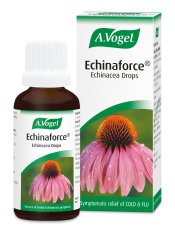An introduction to organic cultivation
As we applaud Organic September, I’ve recently discussed the importance of organic farming for food. Through organic farming we can work with nature rather than against it. This involves celebrating and making use of the whole food chain to support the production of fresh, ethical food.
This is an important principle that Alfred Vogel put into practice in his gardens many years ago. Even to this day, the same principles still apply in our beautiful, organic herb gardens in Roggwil, Switzerland.
Here wildlife is encouraged and pesticides are shunned. The gardens are literally bustling with insects; I can tell you first hand it is simply mesmerising to watch the butterflies dancing in and out of the lupins and the bees making their way around the vibrant Echinacea.
See, insects are an important source of food for other animals such as birds and bats, who feed upon garden pests. Insects are also an essential part of the pollination process of plants (we literally wouldn’t be here without them), plus, they are natural predators to peskier insects like aphids, and very useful workers when it comes to decomposition and producing nutrient rich soil to, in turn, produce nutrient-rich, healthy plants.
Alfred Vogel understood from very early on that organic farming was the way forward, as well as his infamous principle that ‘fresh was best’. We now know from research that fresh is in fact best, as up to 90% of the active ingredients of plants can become lost when they are dried. When it comes to pesticides we are still learning. Although we don’t quite fully understand the true extent of the use of pesticides, if Alfred Vogel’s intuition is anything to go by, we can bet they aren’t preferable.
We do have some evidence to suggest that organic herbs have better nutritional values and bio-active constituents though, and this makes perfect sense. Take Echinacea for example; research has helped prove that Echinacea exhibits unique anti-bacterial and anti-viral properties. We know that as a living plant, Echinacea has to protect itself from bugs carrying infections. If we were then to provide pesticides, in reality, Echinacea could then become quite lazy – after all, it wouldn’t need to protect itself any more.
However, in the absence of pesticides with organic farming, plants instead have to boost their protective abilities and so therefore can up their levels of antioxidants and active ingredients – the very components we want to capture in our remedies1.
Then, let’s not forget the potential health risks when it comes to pesticides.
Over the years many different strains of pesticides have been found to have potential ill effects on our eyes, skin, nervous system, hormones, reproductive and developmental functions, and could also be potential carcinogens. We are constantly becoming aware of new risk factors, and then of course there’s the added worry that regulations aren’t being stuck to when it comes to the types and levels of pesticides being used.
Organic standards are high, and it sounds like it could be for good reason...
How to put these principles into practice
When it comes to Organic September, every little helps. In collaboration with the Soil Association, it’s all about making positive changes to your health, or the environment (or both!) no matter how small.
How to go organic:
•Education. Education is a great start, which we hope we can help with. We want to help people understand the importance of going organic whether it comes to your food or herbal remedies for supporting your health. Remember as Alfred Vogel once said ‘Nature gives us everything we need to protect and maintain our health’. So, by going organic, you get to not only support the environment, by saving the bees for one, but it also means you are avoiding consuming nasty chemicals and supporting your health. Not to mention the additional benefits these remedies can bring of course
•Buy organic. Why not take a visit to a local health food store and see the range of products they have on offer, ask which are organic and get into the habit of looking for logos – the soil association amongst some others such as Bio Suisse are some big names to look out for
•Grown your own. During a recent trip to Switzerland to visit our headquarters (and where it all began for Alfred Vogel), we were lucky enough to see the very organic gardens that he set up himself. Small patches of up to 30 different varieties of herbs were happily growing in the warm June sunshine, and we were able to make our very own organic tincture. It truly was inspiring and can be done – enjoy!
Barański M, Średnicka-Tober D and Volakakis N et al. Higher antioxidant and lower cadmium concentrations and lower incidence of pesticide residues in organically grown crops: a systematic literature review and meta-analyses. 2014, 112(5), 794-811.





 Looking for our products in a store near you?
Looking for our products in a store near you?

